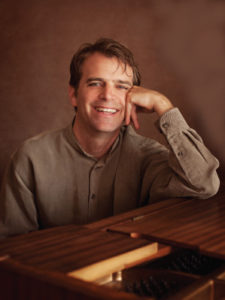Chorfest 2017 Participants’ Guide: Meet the Composer

Victoria-based composer Tobin Stokes has made headlines in recent years, and for all the right reasons, too. (Perhaps you’ve heard of his opera, Rattenbury, based on the life and demise of the famed architect responsible for the BC Parliament Buildings and the Empress Hotel; his high-profile collaboration with Canadian author Margaret Atwood; or his numerous documentary scores for the CBC, BBC and PBS?)
Recently, the BC Choral Federation asked Stokes to write a piece especially for our Chorfest 2017 celebrations, and he came through in a big way with May the Skies Be Clear (May the Waters be Calm).
We don’t want to give away too many spoilers before the Gala Concert on Sunday, May 21, but we did have our communications coordinator Andy Rice reach out to Stokes (coincidentally a fellow Powell Riverite) to learn more about the First Nations influence behind this fantastic piece.
AR: What made you first take an interest in traditional Coast Salish music and begin incorporating those themes into your own compositions? I remember hearing parts of your opera, Scenes from Nootka, at the International Choral Kathaumixw back in 2008. A few years before that came your Symphony No. 1 in Gm – The Coast Salish Symphony. Clearly, you have established a connection with the Tla’amin Nation that has yielded an exchange of texts and musical vocabulary over the years. How far back does it go?
TS: When I was a kid, my mum asked me to donate my tricycle, which she then loaded into her float plane and gave it to a kid in a remote community called Church House. My mum was the public health nurse for some of the First Nations villages north of Powell River, and a float plane pilot, and she often came home with stories and descriptions from these small communities not accessible by road. I think that the tricycle exchange, and the stories I heard started a curiosity and appreciation for the culture that was here long before mine.
Later, when I was starting to compose, I received a commission for a large choral and orchestral work for the 1992 International Choral Kathaumixw Festival in Powell River. I went looking for local ideas and stories, and found them nearby at the Tla’amin Nation band office. On a few different occasions, I met with elders there who shared their stories with laughter, wisdom, and sincerity. The connections have grown from there, and as a generation or two has slipped by, the circle has widened, and I still gather inspiration from the people and stories from that region, and beyond, up the coast of BC.
AR: In the case of May the Skies Be Clear (May the Waters be Calm), can you tell us more about this text and what it means? I can’t help but notice it was translated by a group of Tla’amin elders who, unfortunately, are no longer with us. Had you been sitting on it for a while, waiting for the right time to use it?
TS: The phrase Hahm kwu y tlauk, hahm kwu e metl translates roughly as, “May the skies be clear, may the waters be calm”. This saying is to wish people well on their journey. The elders shared this at one of our first meetings. They had me practicing it then, so I’ve never forgotten it. I’m sure if they could hear me speak it now they’d still be smiling while wincing at my horrible pronunciation. The occasion of this new piece for Chorfest seemed a perfect fit to return and explore the phrase.
AR: As we come up on Canada’s sesquicentennial this summer, it is important for all of us to acknowledge the many atrocities committed against First Nations peoples, even within the last 150 years alone. (For example, the Potlatch Ban that was in place from 1880 to 1951. As a result, entire generations grew up without their oral history – without songs, without dances, without longstanding cultural values.) What are your thoughts on music as a medium for reconciliation?
TS: Yes, music, art and stories can be used as positive steps after cultural atrocities. To seek ways to identify, culturally and socially, is to be human. So, using music for reconciliation, and connecting, bonding, and sharing, is a no-brainer. Last spring, for example, I had the chance to collaborate with Tla’amin songwriter Drew Blaney, and together we created a piece presented at the PRISMA festival in Powell River, for orchestra, singers, and drums. The piece was a celebration of the new Tla’amin self-governance, and now one of the melodies Drew conceived for that event will live on as an anthem to be sung at celebrations, and it can be accompanied by full orchestra!
AR: How can we as musicians, conductors and composers best acknowledge and honour a First Nations history that reaches far beyond 150 years through our commissions, conversations and programming choices?
TS: It’s actually really simple: explore and listen, and if inspiration comes, grab it.*
*Editor’s Note: Before incorporating First Nations texts and musical themes into your choral compositions, arrangements or recordings, it is advisable to request formal permission from the respective Nation – a protocol Stokes has exemplified throughout his career.
